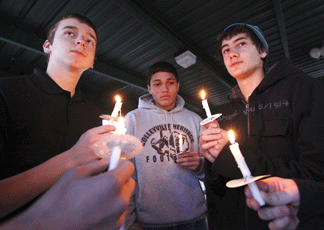It’s said that three things people should never talk about are parenting, religion and politics because everyone has his or her own view on all three.
 This expression and the wisdom behind it really flies in the face of government, economics and world religions teachers. Obviously, in a class held specifically to discuss contentious subjects, disagreements will arise. Teacher Paul Derengowski resigned in an extreme example last semester.
This expression and the wisdom behind it really flies in the face of government, economics and world religions teachers. Obviously, in a class held specifically to discuss contentious subjects, disagreements will arise. Teacher Paul Derengowski resigned in an extreme example last semester.
Two Muslim students in Derengowski’s class said they were offended when Derengowski said Mohammed, Islam’s primary religious figure, doesn’t qualify as a prophet by Christian standards and compared him negatively to Joseph Smith, prophet of the Book of Mormon. The Muslim students became upset, and other students in the class said they behaved frighteningly. The Muslim students conveyed their dissent to their classmates and Derengowski’s bosses, and after Derengowski resigned, he publicly humiliated the Muslim students on his website, which denounces Islam as a cult and makes his personal faith, Christianity, clear.
While neither Derengowski nor his students behaved appropriately, the incident does raise valid questions about world religions classes. If the teachers are more informed about religions, should the ideas they’ve developed on how to worship carry more weight? Extending to politics, if government and economics professors are experts in their fields, should they try to sway their students’ votes?
Well … no!
The ultimate goal of teaching is critical thinking, and that should hold especially true with classes that deal with how students approach politics and religion. On either topic, two people given the same set of facts could interpret them in completely different ways, and both of these ways would be valid. The goal isn’t for students to just know facts. It’s for them to learn to draw their own conclusions based on facts.
To teach this, teachers must be neutral. They may present facts, lead discussions, play devil’s advocate and keep everyone involved, but directing the class with their own personal views is counter to what the goal of the class should be.
Even divulging their personal faith or political alignment isn’t appropriate. A world religions teacher who announces himself as neo-pagan will probably put Judeo-Christians in the class on edge. The words of a conservative economics teacher risk falling on deaf ears of liberal students.
Historic and statistical facts that might sway opinions are good to divulge, but they must be divulged fairly. Going back to the Derengowski example, many of the negative things he said about Islam may have factual grounding, but the Muslim students say there are many positive things about Islam that he didn’t discuss. According to them, this is in direct contrast to his skipping over the Crusades and the Inquisition when discussing Christianity.
True neutrality may seem like an impossible standard, but an instructor who strives for less does students a disservice. Students, in turn, must speak out if they feel they’re being taught unfairly. These are difficult classes to teach, but they can be rewarding if taught properly.
They can also be harmful if taught with prejudice.


























